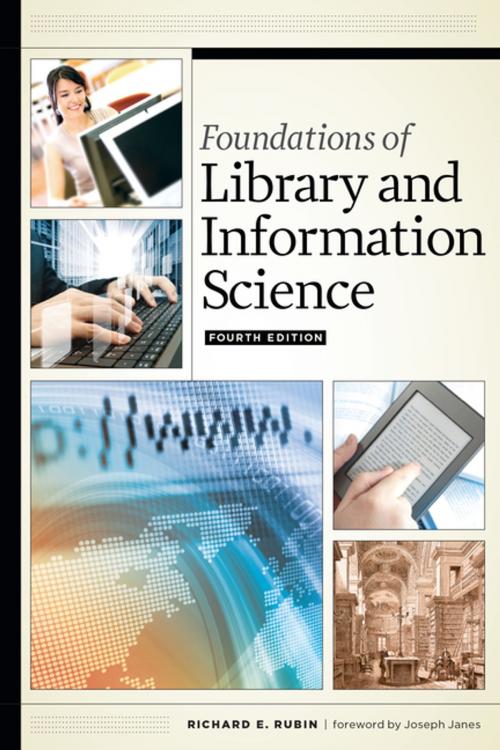Foundations of Library and Information Science
Fourth Edition
Nonfiction, Reference & Language, Language Arts, Library & Information Services, Reference| Author: | Richard E. Rubin | ISBN: | 9780838913734 |
| Publisher: | American Library Association | Publication: | December 1, 2015 |
| Imprint: | ALA Neal-Schuman | Language: | English |
| Author: | Richard E. Rubin |
| ISBN: | 9780838913734 |
| Publisher: | American Library Association |
| Publication: | December 1, 2015 |
| Imprint: | ALA Neal-Schuman |
| Language: | English |
Much has happened since the last edition of this benchmark text was published. Today's LIS professionals are experiencing both excitement and trepidation as sweeping societal, technological, political, and economic changes affect our users and institutions and transform our discipline. We are increasingly part of a sophisticated infrastructure: the boundaries of knowledge creation, acquisition, organization, dissemination, use, and evaluation are rapidly blurring, creating new challenges. Similarly, we are also part of a changing environment: an aging population, a ubiquitous and evolving internet, the proliferation of social media and mobile devices, significant financial stresses on public institutions, and changing information policies affecting creators and distributors of knowledge. The profession demands constant growth, continuous learning, and open minds, and the new edition of Rubin's book offers a firm foundation of knowledge and guidance for LIS students and professionals alike. Responding to the many changes occurring both in the field and in society at large, this text includes comprehensive coverage of the history and mission of libraries, from past to present; digital devices, social networking, and other technology; the impact of digital publishing on the publishing industry and the effects of eBooks on libraries values and ethics of the profession; how library services have evolved in the areas of virtual reference, embedded librarianship, digital access and repositories, digital preservation, and civic engagement; new and ongoing efforts to organize knowledge, such as FRBR, RDA: Resource Description and Access, BIBFRAME, the Semantic Web, and the Next Generation Catalog (Catalog 2.0); the significance of the digital divide and policy issues related to broadband access and network neutrality; the concept of intellectual freedom, and how it plays out in the real world; legal developments like new interpretations of copyright related to mass digitization of books (Google Books) and scholarly articles; the continuing tensions in LIS education between information science and library science; and initiatives to integrate libraries, archives, and museums (LAMs); Spanning all types of libraries, from public to academic, school, and special, this book illuminates the major facets of library and information science for aspiring professionals as well as those already practicing in the field.
Much has happened since the last edition of this benchmark text was published. Today's LIS professionals are experiencing both excitement and trepidation as sweeping societal, technological, political, and economic changes affect our users and institutions and transform our discipline. We are increasingly part of a sophisticated infrastructure: the boundaries of knowledge creation, acquisition, organization, dissemination, use, and evaluation are rapidly blurring, creating new challenges. Similarly, we are also part of a changing environment: an aging population, a ubiquitous and evolving internet, the proliferation of social media and mobile devices, significant financial stresses on public institutions, and changing information policies affecting creators and distributors of knowledge. The profession demands constant growth, continuous learning, and open minds, and the new edition of Rubin's book offers a firm foundation of knowledge and guidance for LIS students and professionals alike. Responding to the many changes occurring both in the field and in society at large, this text includes comprehensive coverage of the history and mission of libraries, from past to present; digital devices, social networking, and other technology; the impact of digital publishing on the publishing industry and the effects of eBooks on libraries values and ethics of the profession; how library services have evolved in the areas of virtual reference, embedded librarianship, digital access and repositories, digital preservation, and civic engagement; new and ongoing efforts to organize knowledge, such as FRBR, RDA: Resource Description and Access, BIBFRAME, the Semantic Web, and the Next Generation Catalog (Catalog 2.0); the significance of the digital divide and policy issues related to broadband access and network neutrality; the concept of intellectual freedom, and how it plays out in the real world; legal developments like new interpretations of copyright related to mass digitization of books (Google Books) and scholarly articles; the continuing tensions in LIS education between information science and library science; and initiatives to integrate libraries, archives, and museums (LAMs); Spanning all types of libraries, from public to academic, school, and special, this book illuminates the major facets of library and information science for aspiring professionals as well as those already practicing in the field.















